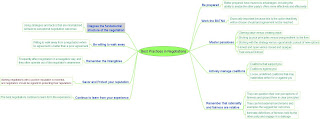The purpose of this chapter is to provide us of negotiation with an overview of the field of negotiation, perspective on the breadth and depth of the sub processes of negotiation, and an appreciation for the art and science of negotiation. We reflect on negotiation at a broad level by providing 10 “best practices” for negotiators.
1. Be Prepared
better prepared have numerous advantages, including the ability to analyze the other party's offers more effectively and efficiently.
2. Diagnose the fundamental structure of the negotiation
Using strategies and tactics that are mismatched will lead to suboptimal negotiation outcomes.
3. Identify and work away
especially important because this is the option that likely will be chosen should an agreement not be reached.
4. Be willing to walk away
Willing to walk away from a negotiation when no agreement is better than a poor agreement.
5. Master the Key Paradoxes of Negotiation
5.1 Claiming Value versus Creating Value
5.2 Sticking by Your Principles versus Being Resilient to the Flow
5.3 Sticking with the Strategy versus Opportunistic Pursuit of New options
5.4 Honest and Open versus Closed and Opaque
5.5 Trust versus Distrust
6. Remember the intangibles
Frequently affect negotiation in a negative way and they often operate out of the negotiation’s awareness
7. Actively manage coalitions
7.1 Coalitions against you
7.2 Coalitions that support you
7.3 Loose, undefined coalitions that my materiel either for against you
8. Savor and protect your reputation
Starting negotiations with a positive reputation is essential, and negotiators should be vigilant in protecting their reputations.
9. Remember that rationality and fairness are relative
9.1 they can question their own perceptions of fairness and ground them in clear principles
9.2 they can find external benchmarks and examples the suggest fair outcomes
9.3 illuminates definitions of fairness held by the other party and engage in dialogue
10. Continue to learn from the experience
The best negotiators continue to learn from the experience.
1. Be Prepared
better prepared have numerous advantages, including the ability to analyze the other party's offers more effectively and efficiently.
2. Diagnose the fundamental structure of the negotiation
Using strategies and tactics that are mismatched will lead to suboptimal negotiation outcomes.
3. Identify and work away
especially important because this is the option that likely will be chosen should an agreement not be reached.
4. Be willing to walk away
Willing to walk away from a negotiation when no agreement is better than a poor agreement.
5. Master the Key Paradoxes of Negotiation
5.1 Claiming Value versus Creating Value
5.2 Sticking by Your Principles versus Being Resilient to the Flow
5.3 Sticking with the Strategy versus Opportunistic Pursuit of New options
5.4 Honest and Open versus Closed and Opaque
5.5 Trust versus Distrust
6. Remember the intangibles
Frequently affect negotiation in a negative way and they often operate out of the negotiation’s awareness
7. Actively manage coalitions
7.1 Coalitions against you
7.2 Coalitions that support you
7.3 Loose, undefined coalitions that my materiel either for against you
8. Savor and protect your reputation
Starting negotiations with a positive reputation is essential, and negotiators should be vigilant in protecting their reputations.
9. Remember that rationality and fairness are relative
9.1 they can question their own perceptions of fairness and ground them in clear principles
9.2 they can find external benchmarks and examples the suggest fair outcomes
9.3 illuminates definitions of fairness held by the other party and engage in dialogue
10. Continue to learn from the experience
The best negotiators continue to learn from the experience.






